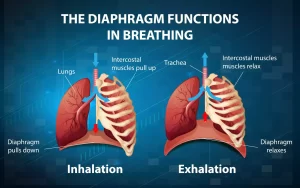We can become aware of breathing at any moment and influence it. This way, we can start breathing more correctly and also feel better. However, the moment we shift our attention elsewhere, breathing returns to its original state. It is necessary to look for the reason why the body keeps returning to improper breathing, regardless of how much we want to change for the better.
Manipulation of the breathing rhythm most often occurs in the first years of growing up, but later it is only reinforced and internalized. A newly born baby is initially helpless and requires his parents’ help to survive. The parent’s job is to recognize and fulfill their child’s needs. If any of his needs aren’t met, the child will feel an increasing imbalance within himself, warning the parents of this by altering his behavior – his movements and voice point to him being in an uncomfortable situation. This warning is usually sufficient for parents to recognize what the child lacks and fulfill the need. The child receives what he needs – this calms him down, and so does his breathing.
However, sometimes it happens that, despite the child’s crying, the parents can’t fulfill his needs. This happens in families where parents grew up in an environment that didn’t allow them to develop into completely functional adults. A low level of adulthood prevents them from knowing how to efficiently take care of both their and their child’s needs. The baby’s crying eventually starts to annoy them (either on the conscious level, but mostly (maybe on a conscious level, but more often on an unconscious level).
The child understands the parent’s anger as a threat that his caregivers are burdened with his needs, which causes him to fear that he will be abandoned or punished in some other way. These unpleasant feelings create anxiety in the child, for which his surroundings offer no solution. The imbalance inside the child increases, but because he cannot change his surroundings with his expression, he can only change his behavior. He changes it in such a way that he suppresses certain needs and prevents himself from sharing these feelings with others. Children do not choose these behavioral changes but are forced into them.
The child decreases their parent’s stress by manipulating their behavior, which lowers his primary fear of abandonment. This helps him free himself of anxiety and prevents the family from falling apart, but suppression comes at a price. In this case, we’re talking about chronic muscle tension (this is also manifested in irregular breathing), which greatly reduces the quality of life.
Chronic contraction negatively impacts a person’s development, which prevents the child from completely maturing. Immaturity in a person can be recognized by their behavior which is often unrealistic and inappropriate for the given situation. They possess a poor sense of moderation and can’t recognize when something is too much or too little. They react excessively to changes in the environment. The result differs from the originally set desire, which prevents a person from moving his life in the direction he wants. The inconsistency of results and desires is an external reflection of a person’s mismatch in the mind-body connection. If, at this point, the person decides to start a family, the cycle continues and transitions into an intergenerational transmission of ineffective behavior and, thus, distorted breathing patterns.
AEQ’s 30-day online breathing program will help you better understand why and how events from your childhood affect your present. This will allow you to understand and accept yourself more easily, trust yourself more and more, and start living more relaxed.






